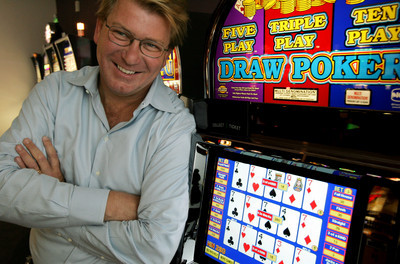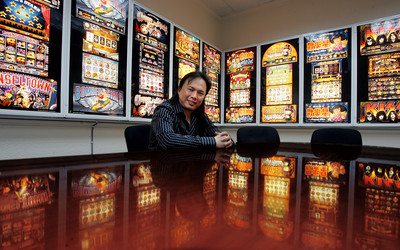Working for hire, indie slot makers succeed
Inside offices at one of the nondescript industrial parks east of McCarran International Airport, Benny Sum and his team of about 60 slot machine designers work long hours to churn out games free of the major casino equipment manufacturers.
With several different platforms to choose from, slot machines and games produced by Sum's Global Gaming Group are finding any number of homes, including European and Asian casinos, the video lottery industry and American Indian-run gambling halls.
However, it is not beneath Sum to take on a mercenary role.
Often, he is called upon by the larger slot machine companies to design certain games or a line of gambling products.
It's a business model that Sum has cultivated since 1994 and one that has helped Global Gaming Group become one of the few slot machine designers to remain independent within the ultracompetitive gaming equipment fraternity.
"It's not so much that we're competing with the big boys. We've always been kind of a hired gun to the industry," said the soft-spoken Sum, who carries the dual title of founder and chief design officer.
"Sometimes we'll finish up a project for the manufacturers and other times we'll do our own home cooking and create something that is unusual and different for the gaming industry."
In the end, Sum said, the casino and the gambling public win when cutting-edge slot machines with creative game content find their way to the casino floors.
"Both the operators and customers don't really care which manufacturers design the game they like to play," Sum said. "That's just politics inside the companies."
Wall Street estimates that Reno-based International Game Technology controls more than 60 percent of the slot machine market domestically. Large game makers, such as WMS Industries, Bally Technologies, Aristocrat and Konami, are in a heated fight for the remaining space. That doesn't leave much room for the small, independent slot machine makers.
The cost of entry -- design work, research and development, game sales, regulatory approval and U.S.-issued patents are part of the process -- sidelines many fledgling slot makers.
"The best scenario for a small slot maker is to develop a game and sell it to one of the big companies," said David Schwartz, director of the Center for Gaming Research at the University of Nevada, Las Vegas. "The days of the stand-alone slot machines are long since gone because there is so much interface that needs to go on with all the software."
Schwartz said visitors to the annual Global Gaming Expo in Las Vegas will often see small game designers trying to sell their ideas to the big slot machine manufacturers.
"It can be heartbreaking because it's almost like looking at dogs in a pound," Schwartz said.
A handful of designers, such as Sum's Global Gaming Group, become adjuncts for the major machine makers, helping design games and content. At the same time, they gain the connections and resources to produce their own machines with unique content.
"It is not easy and it's very competitive," Sum said. "If one can't stand the heat, they usually get out of the kitchen. But if one could stand the heat and they are good, chances are they will also be embraced by the major manufacturers. The big companies can be pretty generous and do things to attract the smaller companies."
Privately held Action Gaming oversees the bulk IGT's video-poker machine business. Action Gaming, founded in 1997 by inventor Ernie Moody, patented the idea of multihanded Triple Play Poker. Moody introduced the game to IGT and a marriage was made.
Action Gaming has more than 16,000 games in the field and an exclusive manufacturing and distribution agreement with IGT. Action has brought dozens of different video-poker games into casinos, testing the games through videopoker.com, a free Web site that serves as a teaching tool for players.
Mike Fields spent four years with IGT managing the video poker department. Three years ago, as Action Gaming's role increased, Fields left IGT for to become an executive vice president with Action Gaming.
He said the company concentrates on developing and promoting video poker and IGT recognizes Action Gaming as an offshoot of the slot maker's research and development arm. Action Gaming bears the burden of figuring out which product will do well on the casino floor.
The company has succeeded, Fields said. Action Gaming controls almost 70 filed and published patents covering video poker. The company's games make up almost 3 percent of the North American slot machine market.
"There is a beauty in specialization, and we're in an unique position," Fields said. "IGT works with a number of development companies, and we are clearly the largest based on the number of units in the field. IGT benefits enormously from the fact that all we do is video poker. All we think about are ways of creating more excitement around video poker, whether that's inventing new games or modifying old ones."
Action Gaming also removes IGT from the process of evaluating potential new game content for video poker. Fields estimates he talks with 15 inventors a month either by phone, e-mail or in person to discuss a possible new video poker innovation.
Most meetings don't result in a new game. Nevertheless, Action Gaming files the paperwork for between 10 and 15 new patents a year.
"Filing a patent is a long and expensive process," Fields said. "That is one of the barriers to the small slot maker. We give some respect to people trying to invent a new game because that's how we started out."
Sum wouldn't say how many patents Global Gaming holds, but he understands the process of getting a new slot concept into the market. He spent five years designing games for Bally before branching out on his own. He was responsible for the design and development of several popular game themes. On his own, the company produced more than three dozen new slot games in one year for the expanding Russian gaming market.
Through the relationships he built with the major slot makers, Sum has been able to take his company's own games and place them in slot machine boxes owned by the larger companies. Sum works directly with casino operators, building slot machines that fit a particular need or purpose.
"Sometimes, we can find out from the operators exactly what they expect from a slot machine, such as what features and functions they like," Sum said. "We can build games custom-ordered to their liking because the bigger slot machine companies have bigger agendas."
The conference room at Global Gaming's offices displays the artwork for many of the video slot machines designed by Sum and his team.
"Think of the DVD player. We produce the DVD that goes in the DVD player," Sum said. "Being a smaller company, sometimes we have to make much bolder moves to do things other people haven't done. Being a smaller company makes us a little more flexible."
Many gaming analysts believe the slot machine market will consolidate. The last major buyout took place in 2001 when IGT purchased Anchor Gaming. IGT also bought Acres Gaming in 2002 for its gaming systems products.
Despite its closeness with IGT, it's doubtful, Fields said, that Action Gaming would ever become a subsidiary of the slot machine giant.
"It would probably be a reasonably expensive proposition to buy us out," Fields said. "Ernie is an inventor at heart and the relationship we have with IGT has been pretty good for both of us."
With 20 years designing slot machine products, Sum has no intention of ever going back into business with just one slot machine company.
"I don't want to be fed by one source, and while I like working with the slot machine companies, I enjoy dealing directly with the operators." Sum said. "We can cater to a casino's specific needs and in some ways, we are sort of one-stop shopping for the gaming industry."
This story first appeared in the Business Press. Howard Stutz writes for the Business Press' sister publication, the Review-Journal. He can be reached at 477-3871 or hstutz@reviewjournal.com.
A POSSIBLE BOON FOR CONTENT PROVIDERS
The advent of server-based gaming may be a windfall to both Action Gaming and Global Gaming Group.
Conceptually, server-based gaming, or downloadable technology, will allow casino managers to program slot machines with content stored on a central server, allowing the player a choice of a particular slot machine game and wagering denomination. Most of the major slot makers are developing and testing server-based technology. Gaming analysts say the products could reach casinos by 2009.
With slot machines potentially offering hundreds of game titles, the need for game content may be greater than the major slot makers can provide.
"The server-based environment may be similar to cable television," Action Gaming's Mike Fields said. "Channel surfing could be a consideration and companies like IGT may latch onto game developers to provide content."
Global Gaming's Benny Sum said game concepts his company has created for markets other than traditional casino floors, such as the Internet, may find a new use in server-based technology.
"I personally see the paradigm shift where there will be more power to the content over the hardware," Sum said. "The hardware people created a tremendous product. They have created a delivery vehicle and it is up to the content providers to deliver that entertainment to the customers."
HOWARD STUTZ / REVIEW-JOURNAL


















